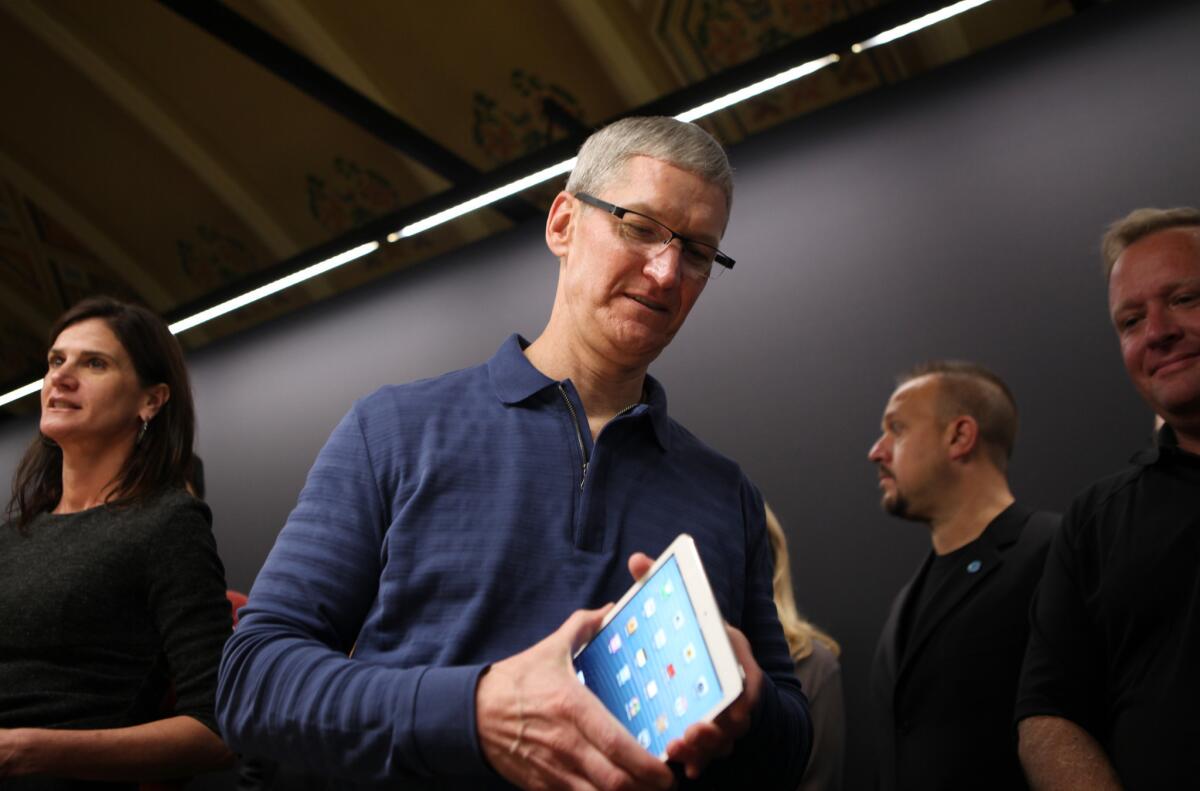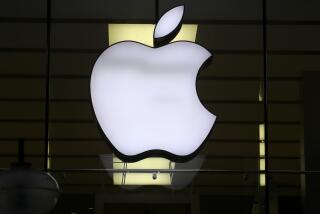Apple CEO talks priorities, profits and products customers love

- Share via
Well, it’s all over but the shouting. And the analysts’ notes. And the target price estimate revisions.
Apple released record numbers Wednesday and received a swift kick in the head from investors who bludgeoned the stock.
But during a one-hour earnings call with analysts after the earnings were released, CEO Tim Cook offered lots of happy talk. While analysts certainly seemed muted in their responses and skeptical in their questioning, Cook oozed confidence and optimism while avoiding getting defensive.
“You’ll hear a lot of impressive numbers on this call,” Cook said. “But they’re not the only way we measure our success. At Apple, it’s important to us that we make products that customers not just like, but love.”
QUIZ: Test your Apple knowledge
Katy Huberty of Morgan Stanley and Goldman Sachs analyst Bill Shope wondered whether the company was sure it had the right lineup in terms of iPhone screen sizes and price points.
Cook said: “The iPhone 5 offers a new, four-inch retina display. This is the most advanced display in the industry. It also provides a larger screen size to iPhone customers without sacrificing the ease of use that our customers love. We put a lot of thought into screen size and we think we’ve picked the one our customers want.”
Analysts also asked about trade-offs between doing what is necessary to capture market share by making cheaper products with low profit margins versus making the pricey, beautiful gadgets that are Apple’s hallmark.
Cook said there isn’t necessarily a trade off: “The most important thing to Apple is to make products that enrich our customers’ lives. That’s our high order bit. We want to make only the best products.... With the iPod, we have been able to offer different products at different prices. So I wouldn’t view those things as mutually exclusive.”
The man who built Apple’s sprawling supply chain also acknowledged that his baby was the root cause of some of the issues that may have left investors disappointed with the company’s performance last quarter.
Cook: “We left the quarter with significant constraints on the iMac. And we know that our sales would have been materially higher. We tried to tell people that on the last call. But I recognize to some people this may have been a surprise.”
And: “We could not build enough iPads to come into a demand balance.”
Cook also offered his thoughts on why Apple still retained is “halo effect,” an advantage that would continue against competitors.
Cook: “We have great experience that when someone buys an Apple product, they buy another.”
Cook said the company doesn’t “fear cannibalization.” On the iPad, the company has the “mother of all opportunities” because tablets could be bigger than PCs one day.
Cook noted that the 2 million Apple TVs sold last quarter was up 60% year over year: “What was a small niche that loved it, is now a larger number that love it.”
Cook on the product refresh cycle last quarter, and whether it will continue at the same rate this year: “80% was an usually high percentage for us. The number of ramps was unprecedented.”
Cook on Apple Maps: “We’re going to keep working on it until it meets our incredibly high standards.... There’s a lot more we can do. And you can bet we’re thinking about it.”
Cook on Apple’s product road map: “We’re working on some incredible stuff. The pipeline is chock full.”
Finally, Cook actually addressed the endless rumor-mongering that flows (allegedly) from Apple’s supply chain: “It’s good to question the accuracy of any rumor about build plans. And even if one data point was accurate, it would be impossible to interpret what it means for our overall performance.”
Also:
Microsoft reportedly in talks to invest in Dell buyout
Google shares up nearly 5% on better-than-expected earnings
Google Fiber ‘not a hobby,’ could expand, tech giant’s execs say
Follow me on Twitter @obrien.
More to Read
Inside the business of entertainment
The Wide Shot brings you news, analysis and insights on everything from streaming wars to production — and what it all means for the future.
You may occasionally receive promotional content from the Los Angeles Times.











